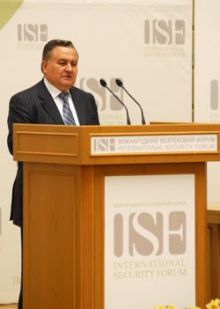LVIV — On April 15, 2010, Ivan Franko National University hosted the launch of the international forum “From Ukrainian to European Security. Challenges of the 21st Century,” involving national security and international relations experts from 20 countries, including the EU members, Russia, other CIS member countries, US, and China. This large-scale project was initiated by leading Ukrainian statesmen, scholars, and public figures on Dec. 4, 2009, in conjunction with the 15th anniversary of the Memorandum on Security Assurances signed in Budapest, Dec. 5, 1994, and Ukraine’s accession thereto.
Experts believe that over the past 15 years the national security status has changed essentially, with Ukraine finding itself suspended between the two powerful military and political blocs, faced with mounting challenges to international and national security in the Baltic-Black-Caspian-Sea regions, in terms of terrorism, transnational organized crime, drug trafficking, illegal migration, human trafficking, and so on. The situation has been aggravated by the world financial crisis, gas wars between Russia and Ukraine, and frozen conflicts — as in the case with Transnistria. Ukraine is facing domestic challenges, owing to the degradation of state institutions, social infrastructure, health care, and the education system. What is especially important at this point is an expert view on the situation and the working out of effective recommendations aimed at solving acute problems.
Says Yevhen Marchuk, Ph.D. (Law), General of the Army of Ukraine, director, Institute for Security Problems: “This forum is unique and the necessity of holding it was caused by a number of circumstances. There is a dynamic process of transforming the European and world security space.
The change of the Ukrainian political leadership, the proclamation of a new political course with regard to European and Euro-Atlantic integration so far remains to be unequivocally assessed by experts. Add here Ukraine’s so-called non-bloc status that leaves lots of questions unanswered, including the implementation of this status and the problems that give rise to these challenges to the national security of Ukraine.
“Our forum involves leading experts, politicians, and members of parliament — people versed in the subject, but most importantly people who do not represent those in power. We chose non-standard points for our agenda. I hope that our discussion will be open and straightforward, even if touching on certain sensitive issues. Above all, I hope that this discussion will be useful. It may result in producing recipes and recommendations, which, I hope, will be an alternative.
“Whether they will be implemented or even taken into account [by the government] will depend on a number of factors — above all, on the performance of the experts tasked with the figuring out of this problem. I’m saying that Ukraine hasn’t faced such serious security challenges for a long time now — I’m saying this as a man who has dealt with Ukrainian national security problems for so many years, on both the theoretical and practical levels, who has been involved in the signing of numerous agreements and the working out of the national security bill.”
According to Marchuk, the most serious challenges included central and local authorities’ inadequate performance or inactivity: “I’m not saying that it exists, but nor am I saying that it doesn’t exist.” Among other problems are the freedom of speech and the Crimea issue — fortunately, not topping today’s agenda the way it did back in the 1990s. Marchuk says Ukraine’s international milieu should also be taken into consideration: “We mustn’t forget that over 50 foreign military maneuvers, involving more than 200,000 officers and men, have been carried out in the vicinity of Ukraine in the past couple of years.”
Oleksandr Lytvynenko, Ph.D. (Political Science), research director, Council on Foreign and Security Policy, and one of the forum’s organizers, told The Day that this forum is a non-profit public project initiated by people versed in problems relating to security, who do care about Ukraine’s international image or the course it will follow: “We are politically non-affiliated; we aren’t trying to act in accordance with any party program. We welcome various worldviews. We are working to reach our common goal: safe Europe and Ukraine and their sustained development. This Forum is financed by various interested domestic businesses. We haven’t received anything from the central budget.”
This forum will last for two days. The points on the agenda will include “European Security: A view from Kyiv” (presenter Yevhen Marchuk). The European security system will be presented by Li Feng Li (Beijing), Janusz Onyszkewicz (Warsaw), and Fyodor Shelov-Kovedyaev (Moscow). Other reports will be delivered by scholars from the UK, Romania, Kazakhstan, Austria, US, and Ukraine on the opportunities and hazards in the political development of Central and Eastern Europe, security threats stemming from ineffective governmental institutions, military-political aspects, and energy security.
This conference will produce expert recommendations to the OSCE countries regarding security guarantees in Central and Eastern Europe.
“We are planning to turn this security forum into a regular event. We will try to hold it in Lviv, although we have also been received offers from Donetsk and Simferopol,” Marchuk told The Day.







